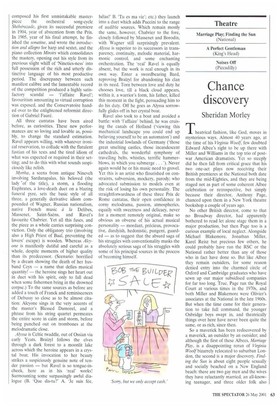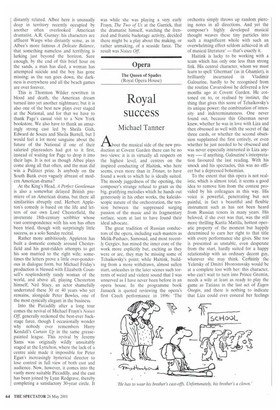Theatre
Marriage Play; Finding the Sun (National) A Perfect Gentleman (King's Head) Noises Off (Piccadilly)
Chance discovery
Sheridan Morley
heatrical fashion, like God, moves in mysterious ways. Almost 40 years ago, at the time of his Virginia Woolf, few doubted Edward Albee's right to be up there with Miller and Williams in the top trio of postwar American dramatists. Yet so steeply did he then fall from critical grace that his two one-act plays now receiving their British premieres at the National both date from the mid-Eighties, and they are being staged not as part of some coherent Albee celebration or retrospective, but simply because their director, Anthony Page, chanced upon them in a New York theatre bookshop a couple of years ago.
No other British director, come to that no Broadway director, had apparently bothered to read let alone stage them in a major production, but then Page too is a curious example of local neglect. Alongside Michael Blakemore, Jonathan Miller, Karel Reisz but precious few others, he could probably have run the RSC or the National rather better than any of those who in fact have done so. But like Albee they remain outsiders, for some reason denied entry into the charmed circle of Oxford and Cambridge graduates who have sewn up our major subsidised companies for far too long. True, Page ran the Royal Court at various times in the 1970s, and both Miller and Blakemore were Olivier's associates at the National in the late 1960s. But when the time came for their generation to take full command, the younger Oxbridge boys swept in, and theatrically things over here have never been quite the same, or as rich, since then.
So a maverick has been rediscovered by a maverick, an outsider by an outsider; and although the first of these Albees, Marriage Play, is a disappointing rerun of Virginia Woolf bizarrely relocated to suburban London, the second is a major discovery. Finding the Sun is about eight people sexually and socially beached on a New England beach: there are two gay men and the wives they have reluctantly married, an all-knowing teenager, and three older folk also
distantly related. Albee here is unusually deep in territory recently occupied by another often overlooked American dramatist. A.R. Gurney: his characters are affluent Wasps who distantly sense, as in Albee's more famous A Delicate Balance, that something nameless and terrifying is lurking just beyond the horizon. Sure enough, by the end of this brief hour on the sands, a man has died, a woman has attempted suicide and the boy has gone missing; as the sun goes down, the darkness is everywhere and all the beach games are over forever.
This is Thornton Wilder rewritten in blood and death, the American dream turned into yet another nightmare; but it is also one of the best new plays ever staged at the National, and for that we have to thank Page's casual visit to a New York bookstore. We also have to thank an amazingly strong cast led by Sheila Gish, Edward de Souza and Sheila Burrell, but I would feel a lot more sanguine about the future of the National if one of their salaried playreaders had got to it first, instead of waiting for Page to drop it into their laps. It is not as though Albee plays come along all that often, and the man did win a Pulitzer prize. Is anybody on the South Bank even vaguely abreast of modern American drama?
At the King's Head, A Petfect Gentleman is also a somewhat delayed British premiere of an American drama, but there all similarities abruptly end. Herbert Appleton's comedy is based on the life and letters of our own Lord Chesterfield, the inveterate 18th-century scribbler whose vast correspondence with his son has often been tried, though with surprisingly little success, as a solo Sunday recital.
Rather more ambitiously, Appleton has built a domestic comedy around Chesterfield and his gout-ridden attempts to get his son married to the right wife; sometimes the letters prove a little over-ponderous in dialogue form, but Michael Friday's production is blessed with Elizabeth Counsell's resplendently randy woman of the world, and above all, playing Chesterton himself, Neil Stacy, an actor shamefully underrated these 30 or 40 years who yet remains, alongside Peter Bowles, one of the most cynically elegant in the business.
Into the Piccadilly after a long tour comes the revival of Michael Frayn's Noises Off, generally reckoned the best-ever backstage farce, though I occasionally wonder why nobody ever remembers Harry Kendall's Curtain Up in the same greasepainted league. This revival by Jeremy Sams was originally wildly unsuitably staged at the Lyttelton, where the lack of a centre aisle made it impossible for Peter Egan's increasingly hysterical director to lose control in full view of both cast and audience. Now, however, it comes into the vastly more suitable Piccadilly, and the cast has been joined by Lynn Redgrave, thereby completing a satisfactory 30-year circle. It
was while she was playing a very early Frayn, The Two of Us at the Garrick, that the dramatist himself, watching the frenzied and frantic backstage activity, decided there might be a play about the making, or rather unmaking, of a seaside farce. The result was Noises Off.



















































































 Previous page
Previous page